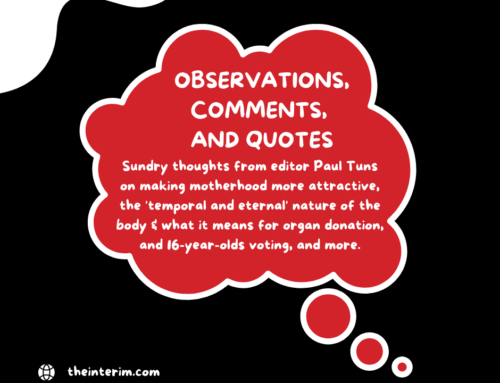It’s impossible these days to open a newspaper or turn on the radio or TV without reading or hearing or seeing more about violence towards women. There are numerous articles in papers and magazines analyzing this sad and shocking phenomenon and suggesting solutions. There is some truth in most of these opinions, but I don’t think I have read anywhere the suggestion that the cause of this social disease lies much deeper than simply an attack of “male chauvinism.”
I believe that the genesis of this social aberration is found in the crumbling of the very basis of society – the family. The family is the primary cell of society and just as a blood disease will have a deleterious effect on the entire person, so a weakening of the family structure cannot but adversely influence the entire social fabric.
“Family life is coming apart at the seams. There are as many divorces as there are marriages. Children and teens run away from an alcoholic father or mother. A mother gets fed up with housework and walks out never to return. A married man runs off with his secretary. These things have always happened. But never in such numbers as today.” (Viewpoint, William Slaney.)
Radical feminism and the family
Radical feminists appear to be foremost in the efforts to destroy the primary cell of society.
“Since marriage constitutes slavery for women, it is clear that the women’s movement must concentrate on attacking this institution. Freedom for women cannot be won without the abolition of marriage.” – Sheila Cronan, US. feminist.
“I consider the Chinese government’s policy (one child per family) among the most intelligent in the world.” – The late Molly Yard, president of the National Organization of Women (NOW) in the Washington Post, Oct. 10, 1989.
“Marriage has existed for the benefit of men. It is a legally sanctioned method of control over women. We must work to destroy it. The end of the institution of marriage is a necessary condition for the liberation of women. Therefore, it is important to encourage women to leave their husbands and not to live individually with men. All history must be rewritten in terms of the oppression of women. We must go back to the ancient female religions like witchcraft.” – The Declaration of Feminism (November 1971).
“In order to raise children with equality, we must take them away from families and raise them communally.” – Dr. Mary-Jo Bane, assistant professor at Wellesley College.
I could fill pages on this subject with statements from popes, bishops and priests. But then, it would be written off by many as the Catholic viewpoint. So I have decided to confine my quotes to people who are writing from a non-religious point of view, from social and practical concerns.
“I think parents will agree that raising a child today is especially difficult. One reason is that so much of the child’s time is under the control of others – the school, the church, the peer group, etc. Because of this, the parents feel that no matter how good a job they do at home, their efforts will have little overall effect on their children.” – Family life expert, Dr. Ross Campbell, in How to Really Love Your Child.
The mother
In every study I have consulted, the predominant role of the mother in the raising of children is stressed. They are all simply confirmations of that old and beautiful adage: the hand that rocks the cradle rules the world. In the past, the hand that rocked the cradle was invariably the mother. Can we bet on that today? In the foreword to an excellent book by Betty Steele, entitled The Feminist Takeover, Dr. Charles Fell of McMaster University writes, “If I were to sum up the book in a few words, I would say the mother is the heart of the family and consequently, of society.”
The father’s function
The father of the child has a very important part to play: “The mother’s capacity to nurture her baby, to enjoy relationships with it, is maximized by the loving care and support she receives from her husband, the child’s father. There is evidence that the child’s intellectual development is maximized by the presence of a caring, involved father, who takes a strong interest in and intimately interacts with and relates to his youngster,” Dr. Rinsley stresses.
“Much of man’s behaviour today is out of harmony with nature’s laws,” and when these laws are defied, disaster is the inevitable result. All known forms of aberrant behaviour are on the increase. The French have a saying: “If you trample on nature, nature will come roaring back.”
May I dare to conclude with a quote from a deceased archbishop of Dublin:
“The family is the source of human life. It is also the place where members of society first learn to relate to others. The virtues on which society depends – love, justice, truthfulness, respect for the rights and dignity of others, concern for those in need, the spirit of co-operation and brotherhood – all these are rooted in family life. Where family life is strong and healthy, these virtues will flourish and society will prosper; where family life is weak, the growth of these virtues will be impeded and society will have many evils.”
Is this telling us something?




